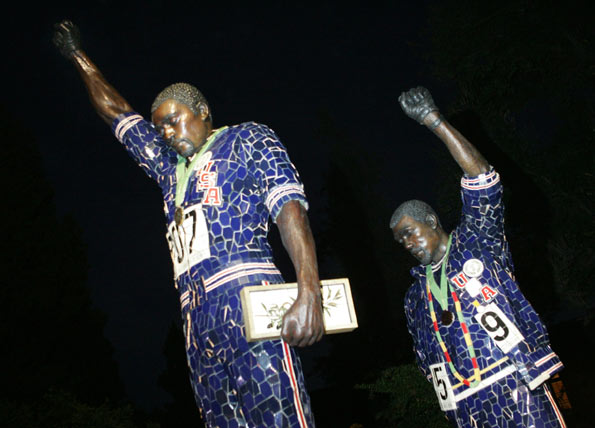Civil rights leader John Carlos speaks in Oakland

The Guardsman
Former Olympic bronze-medal winner Dr. John Carlos spoke alongside civil rights activists Clarence Thomas and Dr. Angela Davis before an electrified crowd at Laney College last Wednesday. His appearance at the college was part of a national tour to promote his new memoir.
In the summer of 1968 Carlos helped define a generation when he and fellow medalist Tommie Smith both gave a black power salute while on the Olympic podium in Mexico City.
The fist-raising track star’s memoir, “The John Carlos Story: The Sports Moment that Changed the World,” has a powerful and simple message: don’t be afraid “of offending your oppressor.”
Laney College President Elnora Webb explained the impact of Carlos’ action in her introduction speech.
“I want to call him something more than John Carlos,” said Webb. “He did something that we all know was the most challenging thing to do at the time. He took a risk that cost him. He did what a lot of us would opt not to do because of the fears, and he didn’t let that stop him. People across the globe saw what he did and were overwhelmed.”
Courage
In a modern context Carlos and Smith’s action might not seem quite so controversial, but in 1968 they faced an terrible public backlash.
Commentators all over the globe condemned the two athletes for damaging the Olympic “brand,” and they were shunned by the sports world. They were unable to find steady employment for years and even received multiple death threats.
However, Carlos never second-guessed himself.
“Don’t be one of those individuals who looks back with regret,” he said. “You think Martin Luther King Jr. didn’t know he was gonna die? Rosa Parks and John Brown, those folks were 1,000 percent committed.”
Civil rights heroes Clarence Thomas and Dr. Angela Davis of the Black Panther Party for Self-Defense also spoke.
These three veteran activists had plenty to say about the lessons they learned during the ‘60s, but they were equally interested in discussing the promise of today’s Occupy movement.
Carlos has been making it a point to visit every Occupy encampment he can during his book tour around the country.
“I am here for you,” Carlos said to a crowd of thousands at Occupy Wall Street in early November. “Why? Because I am you. We’re here 43 years later because there’s a fight still to be won. This day is not for us but for our children-to-come.”
Clarence Thomas
Thomas was a leader in the SF State Black Student Union and the Third World Liberation Front in 1968, helping to organize the longest student strike in American history.
“This was a strike to challenge the idea that Black people and people of color cannot learn, and that we are not capable of engaging in a prolonged struggle,” Thomas said. “I learned we could challenge the system and win. Those on the left need to learn to produce winners, and that is what is happening in the Occupy struggle.”
A third-generation longshoreman, Thomas, along with the International Longshoreman Workers Union (ILWU) recently played a critical role in supporting Occupy Oakland.
On Nov. 2, as tens of thousands of people marched in solidarity with the Occupy movement down to the Port of Oakland, rank-and-file ILWU members refused to cross the community picket line, effectively shutting down the port.
“The thing that makes Occupy Oakland different than other parts of the country is that we had an action with labor at the point of production,” Thomas said. “That port is one of the best examples of the power of Wall Street and American Capitalism, but when action was taken you can bet Wal-Mart was surprised; the whole Pacific Rim was affected.”
The ILWU is continuing to support the Occupy Oakland movement, which has faced escalating police repression in recent weeks. They have invited supporters from Vancouver to San Diego to march on their respective ports on Dec. 12 in an effort to shut down the entire West Coast shipping system.
“If we really want to challenge the one percent, the only thing they really understand is when you hit them in the pocket book,” said Thomas. “Working people have been told we have no power, but can you imagine if longshoremen, supported by their communities on the West and East Coasts and the Gulf, and Teamsters and airport workers all shut it down?”
Angela Davis
“I am so proud of Oakland!” said Angela Davis, a well-known political activist, author, scholar and prison-system critic. “I spoke at Occupy Philly, Occupy Wall Street and Occupy Berlin, and everyone is talking about Oakland!”
In the ‘60s Davis was an active member of the Black Panthers and the Communist Party USA.
“I look at the young people who are involved in the Occupy movement, and it allows me to understand that the work we did was so important,” said Davis. “Imagine what the world would be like without these obscene capitalists, the one percent. Revolution is still on the agenda.”

Comments are closed.